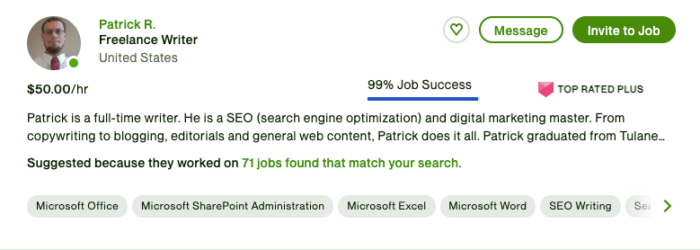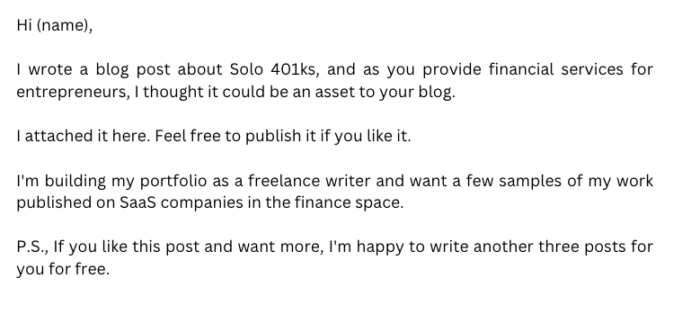You’ve probably already heard that you can make six figures as a freelance writer, but this can sound like a fantasy if you’re just starting your career.
The good news is that landing your dream client is as simple as creating a process and optimizing your outreach strategy.
Below, we’ll outline a proven step-by-step guide that real six figure copywriters use to build successful freelance writing careers.
Step 1: Select a Freelance Writing Niche
Employers want to hire experts, and advertising yourself as a generalist will actually repel potential clients.
For example, if a real estate company is looking to hire a blog post writer, they’ll look for someone specializing in writing for real estate. So between the two writers below, the one advertising himself as a real estate specialist will definitely stand out to the hiring manager:


So what is a writing niche, and how do you select one?
There are three main categories of niches:
- Content Form: Some examples of different types of content include emails, blog posts, ebooks, ghostwriting (for books), social media content, landing/sales pages, and video scripts.
- Business Type: Some examples of business types include SaaS companies, ecommerce companies, online courses, bloggers, and local businesses.
- Industry: Some examples of industries include pets, cryptocurrency, finance, real estate, digital marketing, travel, and healthcare.
So select one specialty from each of the three categories above. Here are a few examples:
- Email copywriter for online course creators in the finance industry
- Blog post copywriter for SaaS companies in the healthcare industry
- Social media content writer for bloggers in the travel industry
While niching down shrinks your target market (list of potential clients), it also shrinks the field of competition and allows you to charge more as you can position yourself as a specialized expert.
If you look at the examples above, the real estate specialist charges double what the generalist charges.
Step 2: Create a Few Quality Writing Samples
Most hiring managers don’t have time to look at more than two to three pieces of content, so you only need a few pieces of high quality content relevant to your niche to win your first freelance writing gig.
If you currently don’t have any writing samples that fit the niche you selected, here are two excellent methods to build your writing portfolio:
- Write a free sample for someone in your ideal target market
- Create your own blog/newsletter/social media page
We’ll discuss how to execute both of these below.
Write a free sample for an influencer in your ideal target market.
If you’re going to write for free, don’t write for anyone.
Write for your dream client. Ideally, this ideal client is someone well connected in your industry and can send you referrals in the future.
However, don’t reach out to them asking if you can write for free. Write a piece of content and send it to them. Then, ask if you can keep sending them free content on a regular basis.
Here’s a great email template you can use:

Doing free work for high-profile clients is also a great way to build industry credibility and it will be much easier to pitch other new clients if you can show work you’ve done for other people those potential clients already respect.
Creating your own content
Another option to build your portfolio is to create your own content.
For example, if you want to be a finance blog writer for SaaS companies, you can start your own finance blog.
This strategy is excellent for building your portfolio because you’ll learn how to write great blog posts and how to grow a finance blog. As SaaS companies want to hire a writer that can produce results – not just words – this will make you stand out against other applicants.
In fact, you might find that writing your own finance blog is more profitable than being a freelance writer for other finance companies.
Note: I purposefully don’t discuss how to build a portfolio website, because in the next step, you’ll see that the strategy you’ll use to close your first paying client doesn’t involve applying to any job boards or submitting a portfolio. In fact, spending time designing a portfolio is often a distraction from doing the hard work of getting your first paying client. So instead, we’ll focus exclusively on how to create great writing samples, and then you’ll send these samples as links or Google Doc attachments in your email pitch.
Step 3: Close Your First Paying Freelance Writing Client
Once you have three to five decent sample pieces, start trying to land your first freelance writing job. You’ll also feel more motivated to continue freelance writing once you have your first paying client. We’ll discuss two methods to get your first paying client:
- Ask for referrals
- Send personalized cold pitches (with a twist)
Asking For Referrals
To find your first paying client, start by asking for referrals from the clients you worked with for free while building your writing samples.
Assuming you did a good job, those clients will likely be more than happy to refer you to friends. (They’ll also probably offer to pay start paying you).
If you feel awkward asking, here’s an exact script you can use:

You can also ask if that person would consider mentioning you in Slack groups and other communities they’re a member of to spread the word.
Again, this is why working for free for well-established industry influencers with large networks is much more beneficial than working for free for any random company.
Send a Personalized Cold Pitch (With a Twist)
Cold pitches can work, but most freelancers don’t know how to make a compelling offer.
Potential clients often receive hundreds of generic pitches from writers each month, so most emails are immediately deleted.
Here are two killer ways to make your cold pitch stand out:
- Send them a free piece of content they can publish, and tell them you can create more content like it consistently if they are willing to hire you.
- Pitch the potential client that you’ll work with a specific content marketing expert on a platform like Clarity or Intro and execute everything the expert recommends. This is a win-win strategy because you become a better writer and can justify charging a high price while the client gets a world-class expert to look over the execution of their marketing process.
It’s also critical to send your pitch to the right person at the correct email address. If you’re reaching out to a large SaaS or ecommerce company, look for the content marketing manager or (if there isn’t a content manager) head/director of marketing.
You can just search “marketing” or “content” on the company’s LinkedIn profile to find the right person, and Hunter.io and Verifalia are excellent resources to find email addresses.

If you can’t find the person’s email address, you can also contact them directly on a social media platform like LinkedIn or Twitter.
While it may seem simple, those two strategies are generally the most effective for getting your first paid freelance writing job.
Many newer (and even some more established) freelance writers struggling to close clients make the mistake of mass applying to writer positions on job boards.
Mass applying is never a good idea because swamped hiring managers usually immediately delete any applications that lack personalization. For example, you can see that the job post below has over 200 applicants.

In addition, applying to jobs places you in direct competition with other applications, and many hiring managers won’t even see your application.
So instead, refer back to your niche and reach out to companies that aren’t advertising that they’re actively hiring for a freelance writing position. While this advice may seem counterintuitive, it’s highly effective because you aren’t competing with other applicants.
In fact, many companies are actively hiring new writers, but don’t actively promote the position precisely because most job boards generate too many applicants.
Another common issue that causes many writers to give up before getting their first client is spending too much time creating a fancy website or business cards.
Most clients don’t care about these things – they just want someone that’s reliable and can do the job. So your time is better spent sending compelling emails with links to excellent writing samples.
Step 4: Seek Feedback and Improve Your Skills As a Freelance Writer
As you work with more clients, you’ll find that each one has slightly different requests, so a key aspect of a great writer is seeking initial feedback and adjusting to your client’s wishes (within reason).
#1: Ask Clients For Feedback
It’s important to be decisive and own your work (you don’t want to constantly bother clients and ask them if your work is acceptable), but clients appreciate communicative freelance writers who take action on feedback.
#2: Join Courses And Communities
In addition to gathering client feedback, the most successful writers also seek mentorship to level up their freelance writing skills. For example, many freelance writers join copywriting courses, hire coaches, and participate in peer groups to improve their skills.
If you’re interested in joining a membership group that gives you direct access to content marketing coaches, live interviews with industry experts, content marketing courses, and a community of high-earning freelance writers, consider joining the Copyblogger Academy.

#3: Seek Feedback From Coaches
You can also use a platform like Clarity or Intro to schedule one-on-one coaching calls with world-class experts.
#4: Start Your Own Content Business
Finally, consider creating a side hustle where you create your own content. For example, if you specialize in writing emails for ecommerce sites, you could start your own dropshipping website and write emails to sell those products.
We recommended this in step two as a method to build your portfolio, but it’s worth mentioning again here, as building your own content platform is a great way to understand the pain points your clients face so that you can learn how to deliver better results.
As clients are paying you to help them grow their business, having your own project is advantageous, as you can use it to run experiments and learn how to improve your skills to drive more sales. This will ultimately make you a better marketer and help you understand how your services fit into the larger growth strategy.
Step 5: Scale Your Career
Getting your first few clients is one challenge, but most professional writers will tell you that keeping your clients and generating steady income over several months is the biggest challenge.
If you want to make more money as a freelance writer and transform your side hustle into a full-time job, here are a few strategies to improve income stability.
Be Reliable And Consistent To Earn Referrals
First, always produce high-quality work, respond to clients within 24 hours, and submit your projects on time. Abiding by these three rules is critical to both retaining clients and creating a network of referrals.
In fact, the most successful freelance writers look at each new client as a new potential referral partner rather than a one-time source of revenue.
Once you have several clients and some case studies demonstrating your work, create a simple website with client testimonials, case studies, and your writing service packages.
You’ll soon reach a ceiling where you can no longer take on additional writing clients, but there are a few different ways you can continue to scale your income without overextending yourself.
Increase Pricing
Increasing your freelance writing rates is the easiest growth lever, and most clients won’t even bat an eye if you increase your prices.
You can also form referral partnerships with lower-level agencies/freelance writers and send them clients that can’t afford to continue working with you.
This is a win-win situation as you can earn a referral partner fee and keep a high-quality client base.
If most of your clients can’t afford to pay a higher price, you might want to consider moving upmarket and targeting larger businesses that can afford to pay more.
Require Long-Term Contracts
The next option to scale your income is to require long-term partnership contracts.
As churn is one of the critical challenges that many freelancers face, keeping your existing clients is a great way to increase your annual income.
Offer Productized Services With Unique, Proven Processes
Finally, the most successful freelancers spend a lot of time learning more about their client’s pain points and then create unique systems and processes to consistently solve those pain points.
If you can show your clients that you have a specific, documented method to solve the exact pain point they have more efficiently than the average freelancer, you’ll be able to charge more and generate more consistent demand.
For example, if you know that most of your clients struggle with “content mill” or “me-too” style content, incorporate expert interviews into your writing process and use that to prove how you’ll create unique content. This alone is often more than enough to make you stand out from the crowd and command higher prices.
If you’re not sure what your client’s pain points are, spend some time talking to them or ask in Slack channels dedicated to your target audience.
Take Action Today
One of the biggest mistakes aspiring freelancers make is spending too much time learning about how to build a freelance business rather than just getting started.
This post has all the information you need to get started, so take action today, as experience is the best teacher.
After you get started, seek feedback and level up your skills. You can join the Copyblogger newsletter for more freelance writing tips or join the Copyblogger Academy to learn from other like-minded freelance writers.

Reader Comments (17)
Hey Stefanie!
What an epic and super valuable post on freelance writing!
I’ve learned a lot of new things here. Really enjoyed reading this.
I think one of the most important things, when it comes to freelance work, is to realize your own potential and your skills so you know exactly and with confidence how you are going to help your customers.
I think having a strong confidence in your skills can make or break your freelance career. Confidence in your writing can be sensed.
Thank you for an amazing blog post!
Cheers! 😀
Thanks Freddy! 🙂
Hey Stefanie. Thanks for the great post. I signed up to be notified about openings a few months ago. I’m really excited that it’s going to be opening up soon.
I was wondering if you have any tips on actually finding the publications that our ideal clients read. I guess this is part of figuring out who the ideal clients are (I’m making progress in this area thanks to other Copyblogger articles.)
Also, I was wondering if you could clarify how to find people who are already looking for copywriters and content marketers. I just got done reading an article about Facebook advertising, so the first thing that came to mind was building specific audiences. Perhaps there is a way to target people who are looking to hire writers and marketers via Facebook ads?
The other place that comes to mind is Upwork (where I used to find clients.) However, I find the quality of clients to be quite low there.
Anyways, if you have any tips on how to accomplish this one, I would love to hear them.
Thanks again!
-Shannon
Glad to hear you’re making progress narrowing down your ideal client, Shannon! 🙂
Once you do that, I think both finding the publications your ideal clients read and finding people who are already looking for copywriters and content marketers are both a matter of having a content marketing strategy for yourself.
An oversimplified version of what I’m talking about is consistently creating the right type of content for those people — blog posts, podcast episodes, videos, etc. — that helps them with the issues they struggle with.
Part of getting to know your ideal client is having a deep understanding about their worldview and the problems they’re facing.
When they’re looking for solutions online, the content you publish will show them what you’re about and how what you offer can help them.
Here’s a post with some tips about guest posting and forming relationships with publications you want to contribute to:
https://copyblogger.com/find-loyal-readers/
And once you’ve already created content you want to promote with advertising, here are some tips about getting started with social media ads:
https://copyblogger.com/social-media-ads/
Thanks for reading!
Stefanie–You rocked it with this post! Super helpful information for anyone creating a writing services business. These tips are spot on. I took the time to check out the link about pricing, too. Excellence there as well. I was encouraged to find that I was flowing in step with your guidance! Thanks so much for sharing more totally usable wisdom!
Thanks so much, Jane! Sounds like you’re on a roll! 🙂
Hi Stefanie,
Thanks for writing such a helpful post. I’m approaching the end of my first year as a freelance copywriter and this has helped me to reflect on my progress so far and the areas I still need to work on.
Point 4 really resonated – it can’t be just me who experiences the endless confusion between copywriting and copyright? I definitely didn’t go to Law School!
Oh yeah! Being a freelance copywriter has many perks, but ease of explaining what exactly you do is not always one of them. 😉
Congratulations on your first year, Felicity!
Hi Stefanie,
Thanks for the valuable tips!
I think especially point 2 is very important, as sometimes it’s kind of difficult to assess your own goals. Therefore goals need to be realistic and not just long-term goals but also short-term goals, as you mentioned. This is something I had to learn first.
Once again, great article!
Cheers, Abel
Thank you for sharing valuable tips that I’m going to implement in my freelance journey to get more success. Point 10 is especially for me because I’m not very strong in communicating and convincing the clients to get projects even I have good writing skills.
It’s very common — you’re not alone, Jack!
Thanks for the great tips! If I had known all this when I started my freelancing career, things would have been so much easier for me.
Right on, Alison!
Stefanie–You rocked it with this post! Super helpful information for anyone creating a writing services business. These tips are spot on. I took the time to check out the link about pricing, too. Excellence there as well. I was encouraged to find that I was flowing in step with your guidance! Thanks so much for sharing more totally usable wisdom!
Glad to hear it, Nathan!
I Appreciate all 30 Key points for a freelance writer, but the most important for me where I am giving more attention are listed below.
Learn content marketing strategy
Deliver a return on investment to clients
Organize your email inbox
Assess short-term and long-term goals
Recognize that your skillset helps businesses
Demonstrate you’re dedicated to producing excellent work
Present a compelling service proposal.
Communicate that clients must agree to your terms of service and payment policy
Thank you for sharing valuable content
Thanks for sharing, Ronaled!
This article's comments are closed.